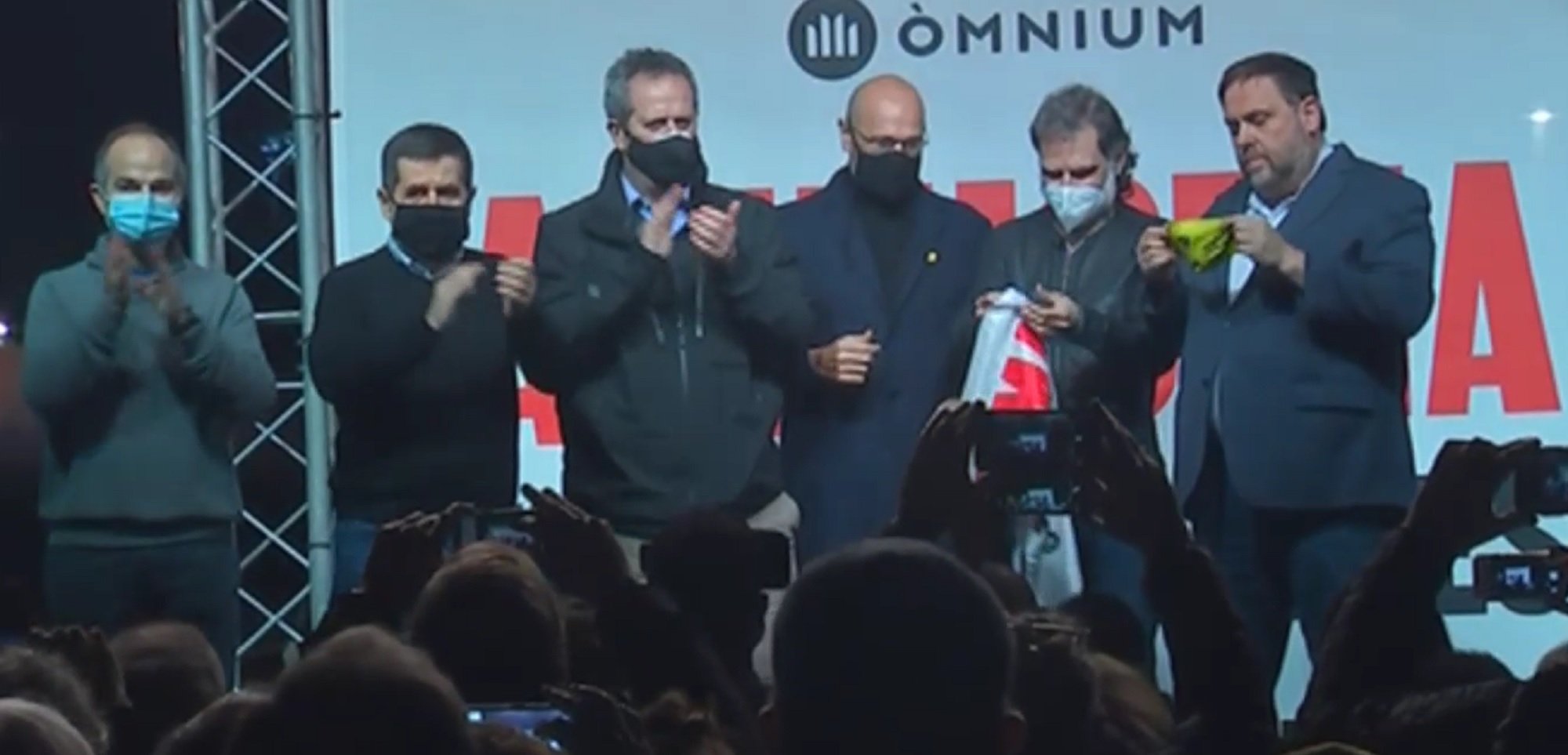The State Solicitors' Office has issued its report on the pardons without taking a position. In the mandatory report assessing the suitability, or otherwise, of granting pardons to political prisoners, it avoids taking a position in favour or against the charges. But it does refer to embezzlement, the only crime upheld and for which a large part of the former government of Catalonia was tried before Spain’s Supreme Court. Because of this, and given that compensation for the damage has already been paid, there is a possibility of the political prisoners will be pardoned.
In the letter sent by the State Solicitor’s Office to the Criminal Chamber of the Supreme Court, it is indicated that "neither the report that is attached to this letter, nor the letter itself, include an assessment of the justice or convenience and form for granting the pardon".
And this, it is stated, because the State Solicitor’s Office acts on behalf of the "offended party" for the economic damage, caused by the October 1st referendum, to the General State Administration of which are part "both the body that has to formulate the pardon proposal (the minister of justice) and the body that has to grant it (the Spanish government)”.
"Given that the General State Administration is a single legal personality (...), it is not up to the undersecretary of finance nor to the State Solicitor’s Office, on its behalf, as bodies of the same General State Administration, to express an opinion on the justice or convenience of the pardon, or how it should be granted, as it could be understood that in doing so it would be anticipating or determining a decision that is the sole responsibility of the government", it argued.
Thus, the report analyses "exclusively" everything related to the crime of embezzlement of public funds for which former Catalan vice-president, Oriol Junqueras, and former Catalan government ministers Raül Romeva, Jordi Turull and Dolors Bassa were convicted.
The State Legal Services consider that the economic damage has already been compensated pursuant to the report issued by the Court of Auditors, which confirms that the 4.1M euros set as the provisional settlement in the trial for expenses and payments for October 1st is guaranteed.
"Having provisionally determined the amount embezzled and who was allegedly responsible, and given that this amount is guaranteed as of today -as stated in the Court of Auditors’ order of February 24th 2020, and in the report of the undersecretary of the Ministry of Finance of March 25th 2021- this guarantee would repair the economic damage caused to the Public Treasury," it argues.
The cost of October 1st
In January 2020, the provisional settlement for the expenses and payments of the referendum went through, in which an alleged amount of 4,146,274.97 euros was declared: 3,903,294.86 euros for the main part and 242,980.11 euros for the estimated interest accrued from the time the events took place until this provisional settlement.
The provisional settlement act, drawn up after the preliminary investigation and valid until sentence is passed, means that those allegedly responsible have to consolidate or deposit the amounts that have been determined. In this case, the 4,146,274.97 euros were consolidated in February 2020.
It was on February 10th when the State Legal Services asked the Supreme Court for this "complementary information" regarding the repayment of the amounts embezzled in the Catalan pro-independence process, because they considered it essential to be able to draw up the report on whether or not to grant pardons to the pro-independence leaders convicted by the Supreme Court.
In the sentence of the Catalan pro-independence process case, the Supreme Court judges already established that the Court of Auditors would be in charge of settling and claiming the civil liability that could have been incurred into by the four persons convicted for embezzlement of public funds, as well as for sedition.
The Public Prosecutor's Office, against
The Criminal Chamber of the Supreme Court, after gathering information from the prison authorities about the twelve convicted persons -nine of them in prison- has already received a report from the Public Prosecutor's Office, which opposes the granting of the pardon due to the seriousness of the facts and because it understands that there are no reasons of justice, equity or public benefit to justify it.
After analysing the arguments of the two prosecutors at the trial, the Chamber will issue its own report, although neither of them is binding on the Spanish government, which has to decide whether or not to grant the requested pardons.
At least seven petitions for pardon were presented in favour of Junqueras, former Catalan government ministers Dolors Bassa, Joaquim Forn, Josep Rull, Raül Romeva, Jordi Turull, Santi Vila, Meritxell Borràs and Carles Mundó. Petitions were also submitted in favour of Jordi Cuixart, Jordi Sànchez, and Carme Forcadell, the former speaker of the Catalan Parliament. Some of them refer to all those convicted and others only to some.
The pardon referring to Junqueras - sentenced to 13 years for sedition and embezzlement of public funds - was submitted by several inmates at Lledoners prison, where he is serving his sentence: the jurist Francesc Jufesa, the president of the Economic and Social Justice party (JES) Sergio Querol and another individual, Juan Andrés Arnáiz Cabezas. In it they asked for a total or partial pardon, either reducing the prison sentence imposed or replacing it with a ban from holding public office.
A pardon may be requested by convicted persons, their relatives or any other person on their behalf. The granting of a pardon is the responsibility of the King, at the proposal of the minister of Justice and after deliberation by the Council of Ministers, and it must be granted through a Royal Decree published in the Official State Gazette.

